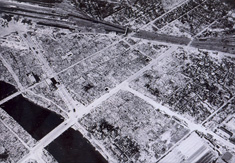 02-03-12, 02:20 PM
02-03-12, 02:20 PM
|
#114
|
Ocean Warrior 
Join Date: Jul 2008
Posts: 3,184
Downloads: 248
Uploads: 0
|

Quote:
Document 62: "Hoshina Memorandum" on the Emperor's "Sacred Decision [go-seidan]," 9-10 August, 1945
Source: Zenshiro Hoshina, Daitoa Senso Hishi: Hoshina Zenshiro Kaiso-roku [Secret History of the Greater East Asia War: Memoir of Zenshiro Hoshina] (Tokyo, Japan: Hara-Shobo, 1975), excerpts from Section 5, "The Emperor made go-seidan [= the sacred decision] ***8211; the decision to terminate the war," 139-149 [translation by Hikaru Tajima] An overview of the destruction of Hiroshima [undated, circa August-September 1945] (Photo from U.S. National Archives, RG 306-NT) An overview of the destruction of Hiroshima [undated, circa August-September 1945] (Photo from U.S. National Archives, RG 306-NT)
Despite the bombing of Hiroshima, the Soviet declaration of war, and growing worry about domestic instability, the Japanese cabinet (whose decisions required unanimity) could not form a consensus to accept the Potsdam Declaration. Members of the Supreme War Council***8212;***8220;the Big Six***8221;[46]***8212;wanted the reply to Potsdam to include at least four conditions (e.g., no occupation, voluntary disarmament); they were willing to fight to the finish. The peace party, however, deftly maneuvered to break the stalemate by persuading a reluctant emperor to intervene. According to Hasegawa, Hirohito had become convinced that the preservation of the monarchy was at stake. Late in the evening of 9 August, the emperor and his advisers met in the bomb shelter of the Imperial Palace.
Zenshiro Hoshina, a senior naval official, attended the conference and prepared a detailed account. With Prime Minister Suzuki presiding, each of the ministers had a chance to state his view directly to Hirohito. While Army Minister Anami tacitly threatened a coup (***8220;civil war***8221 , the emperor accepted the majority view that the reply to the Potsdam declaration should include only one condition not the four urged by ***8220;Big Six.***8221; Nevertheless, the condition that Hirohito accepted was not the one that foreign minister Togo had brought to the conference. What was at stake was the definition of the kokutai (national policy). Togo***8217;s proposal would have been generally consistent with a constitutional monarchy because it defined the kokutai narrowly as the emperor and the imperial household. What Hirohito accepted, however, was a proposal by the extreme nationalist Kiichiro Hiranuma which drew upon prevailing understandings of the kokutai: the ***8220;mythical notion***8221; that the emperor was a living god. ***8220;This was the affirmation of the emperor***8217;s theocratic powers, unencumbered by any law, based on Shinto gods in antiquity, and totally incompatible with a constitutional monarchy.***8221; Thus, the Japanese response to the Potsdam declaration opposed ***8220;any demand which prejudices the prerogatives of his Majesty as a sovereign ruler.***8221; This proved to be unacceptable to the Truman administration.[47] , the emperor accepted the majority view that the reply to the Potsdam declaration should include only one condition not the four urged by ***8220;Big Six.***8221; Nevertheless, the condition that Hirohito accepted was not the one that foreign minister Togo had brought to the conference. What was at stake was the definition of the kokutai (national policy). Togo***8217;s proposal would have been generally consistent with a constitutional monarchy because it defined the kokutai narrowly as the emperor and the imperial household. What Hirohito accepted, however, was a proposal by the extreme nationalist Kiichiro Hiranuma which drew upon prevailing understandings of the kokutai: the ***8220;mythical notion***8221; that the emperor was a living god. ***8220;This was the affirmation of the emperor***8217;s theocratic powers, unencumbered by any law, based on Shinto gods in antiquity, and totally incompatible with a constitutional monarchy.***8221; Thus, the Japanese response to the Potsdam declaration opposed ***8220;any demand which prejudices the prerogatives of his Majesty as a sovereign ruler.***8221; This proved to be unacceptable to the Truman administration.[47]
|
http://www.gwu.edu/~nsarchiv/NSAEBB/NSAEBB162/62.pdf
This sort of shows state of mind after drop of first nuclear bomb.
While there had been consideration for surrender before the first bomb the document still shows high level of stubbornness and lack of consensus.
As i see it its possible that if USA kept on fire bombing Japan conventionally while preparing for attack on mainland Japan might had surrendered without use of A bomb.
I'm not sure if the civilian damage would be lesser though or if allies could had known it for certain at the time.
Last edited by MH; 02-03-12 at 02:38 PM.
|

|

|